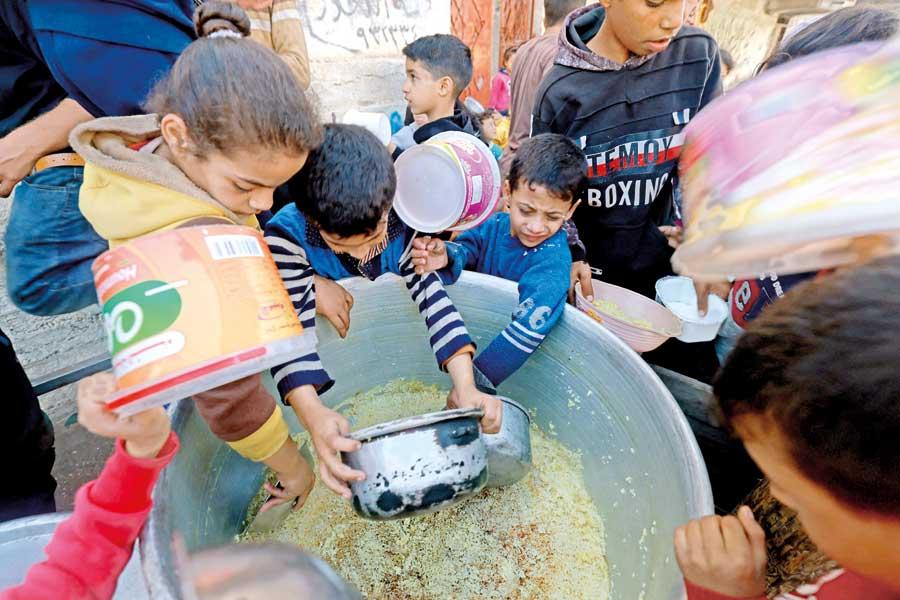08 Dec 2023 - {{hitsCtrl.values.hits}}

Palestinian children collect food at a donation point provided by a charity group in the southern Gaza Strip city of Rafah, on December 6. AFP
With Israel continuing its genocidal war and the Arab and Islamic countries rueing their handicap to militarily challenge Israel, Gaza appears as ground zero of the apocalypse. 
In this genocide Israel is committing with the complicity of some Western nations, particularly the United States, Britain, and Germany, families vanish without any trace.
On Wednesday, an Al Jazeera Arabic journalist lost 22 members of his family: his father, mother, siblings, uncles, and cousins. He was the second Al Jazeera journalist to lose his family in an Israeli attack.
Somaia Abunada, a former Fulbright teacher assistant at Georgia Southern University in the US, is still alive in Gaza to tell her story. Writing to the Middle East Eye, she explains how her family lost their sweet home and ended up on the street within days. When Israel started pounding northern Gaza following the October 7 Hamas attack, she and her family found shelter in her aunt’s house in the southern city of Khan Yunis, which Israel had declared a safe zone. A few days ago, she found herself under rubble after an Israeli missile hit her aunt’s apartment. Volunteers who rushed to the scene rescued her, but her sister died. None survived from the family that lived next door.
A video clip showed an old man pacing out in a hospital morgue. He was talking to a dozen bodies shrouded in white cloth. They were his family. He was heard telling the dead, among them his grandchildren, “When you meet the messenger of Allah, the Prophet Muhammad, please tell him that the people in his city (a reference to the Saudis) did not come to our rescue when we were being massacred.”
As people are killed in families, the questions that resonate in Gaza and the Arab street are: Where are all the 22 Arab countries? Where are the 57 Islamic countries that represent one-fourth of humanity and more than 25 percent of the UN membership?
On the Arab street, people shed tears for Gaza and lament the handicap of their nations. Many are willing to go to Gaza, fight Israel, and help the Palestinians retrieve the land they have lost in the past 75 years of Israel’s settler colonialism. Their collective spirit may be willing, but the system is weak and destined to remain weak. In this system, the Arabs—both leaders and the people—are pawns, not masters of their fate. They are entrapped by the system the West imposed on them after World War I.
What is preventing a common Arab man, angry over what Israel is doing to the hapless people in occupied Palestine, from going to Gaza and being a help to its people in their hour of need? The answer is the nation-state concept with borders.
The borders are closed for Arab youths to go to Gaza, though they were opened for hundreds of jihadists to join ISIS.
It was the victorious West that divided the Arabs and imposed the nation-state concept on them in the wake of their victory in World War I. The Syke-Picot Agreement of 1916 between Britain and France and the San Remo resolution adopted by the Principal Allied Powers in 1920 saw the Middle East, which was an Ottoman territory, Balkanized into nation-states. The system keeps them weak and divided. As a result, these states have become easy prey for the imperial West, on which they depend for their security.
On the contrary, Islam calls on its adherents to remain united within a political system called Khilafah, or the Caliphate. The last such caliphate was that of the Ottomans. It collapsed due to its failure to implement meaningful power devolution to the periphery. The result was the betrayal of the caliphate by its Arab subjects. They joined the Allied Powers when World War I broke out in the hope imperial Britain would give them a united kingdom of Arabia—a state by the Arabs, for the Arabs, and of the Arabs. But it was not to be. The region was parcelled out and made into many states, paving the way for inter-Arab conflicts, coups, skullduggeries, civil wars, dictatorships, human rights violations, wars, more wars, and now genocide.
Each Arab nation pursues its own national interest rather than the interests of the entire Arab region. Attempts at pan-Arabism were largely empty talk.
To their credit, some Arab nations are, however, tirelessly doing their best within the limits to bring about a ceasefire and save lives in Gaza. More than a month after Israel declared war on Hamas and Gaza’s civilians and babies, leaders of the Arab League and the Organisation of Islamic Cooperation (OIC) held an emergency summit in Riyadh to address the Gaza crisis. At this summit, some states called for an oil boycott, similar to what they did in 1973. But the majority did not agree. No one called for a military solution.
This week, the leaders of Gulf countries and Turkey met in Doha. Action with caution appears to be their approach to solving the Gaza crisis and saving the people who have nowhere to run as Israel has expanded the war to the south.
At the United Nations, Arab and Islamic nation ambassadors still keep faith in diplomacy. But their efforts are dead on arrival, with the US killing any move that does not please Israel, even if it means President Joe Biden losing the support of progressive Democrats and Muslim voters and the reelection bid.
Arab states may call for a ceasefire, condemn Israel, withdraw their ambassadors from Tel Aviv, and double down on diplomatic efforts to bring about another pause in the fighting, but will not resort to military action. They are not willing to put their security and economic interests at stake by prioritising Palestine. The weapons they buy from the US come with a condition: Do not use them against Israel. Some Arab states have cosied up to Israel and are depending on Israel’s help to deal with Iran and Iran-backed militias: Hamas, Hezbollah, and the Houthis.
Some say Arabs are good at fighting each other, not Israel. An imam said that if we want to get the Arab states to fight Israel, tell them that Israel has converted to Shiite Islam. He was referring to Sunni Arab leaders’ animosity towards Shiite Iran.
Another imam quoted the narration of Prophet Muhammad. According to the narration recorded in Sunan Ibn Dawood, the prophet said, ‘The people would soon summon one another to attack you as people, when eating, invite others to share their dish’. A companion of the prophet asked, ‘Will that be because of our small numbers at that time?’ The prophet replied, ‘No, you will be numerous at that time, but you will be like scum and rubbish like that carried down by a torrent, and Allah will take fear of you from the breasts of your enemy and cast al-wahn into your hearts.’ Someone asked: ‘What is wahn (lack of vitality)?’ The prophet replied, ‘It means the love of the world (materialism) and dislike of death.’
25 Dec 2024 9 hours ago
25 Dec 2024 25 Dec 2024
25 Dec 2024 25 Dec 2024